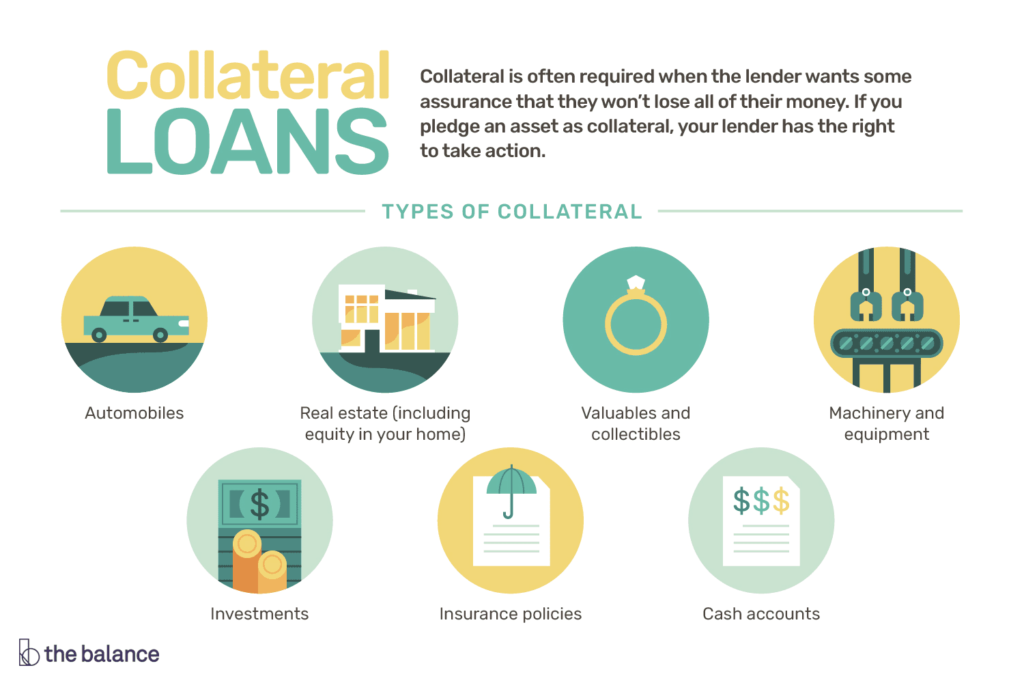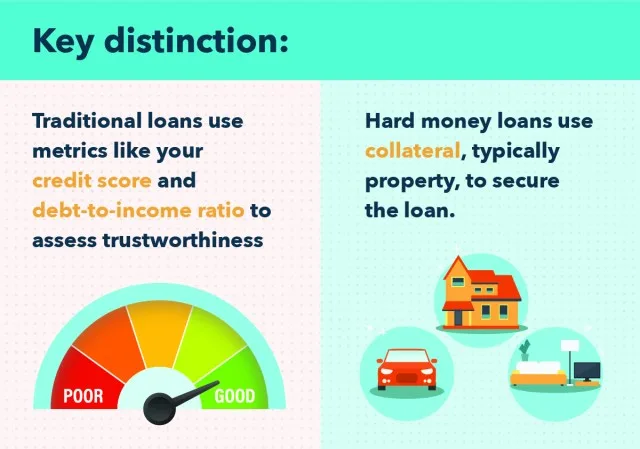In the realm of hard money loans, collateral plays a vital role in securing the funds. Unlike traditional bank loans, where credit history and income are the primary factors considered, hard money lenders focus on the value of the collateral provided by the borrower. Collateral serves as a form of protection for the lender, ensuring that if the borrower defaults on the loan, the lender can recoup their investment by selling the collateral. This article explores the significance of collateral in hard money loans, demonstrating its crucial role in the borrowing and lending process.
What is a Hard Money Loan?
Definition of a hard money loan
A hard money loan is a type of short-term financing that is secured by collateral. Unlike traditional loans that are based on creditworthiness and income, hard money loans rely primarily on the value of the collateral provided by the borrower. These loans are typically funded by private investors or lending companies, and are often sought by borrowers who may not meet the strict requirements of traditional lenders.
Characteristics of a hard money loan
Hard money loans have several distinguishing characteristics. Firstly, they are short-term loans with relatively high interest rates compared to traditional loans. This is because hard money loans are considered riskier due to the reliance on collateral rather than the borrower’s financial situation. Secondly, hard money loans have a quick turnaround time, with loan approval and funding typically occurring within a matter of days or weeks. Lastly, hard money loans often have more flexible lending criteria, allowing borrowers with less than perfect credit or income stability to secure financing.
The Importance of Collateral in Hard Money Loans
Primary role of collateral
Collateral serves as the primary security for hard money loans. It is the asset that the lender can seize and sell in order to recover their investment in case the borrower defaults on the loan. Collateral acts as a form of protection for the lender and serves as a guarantee that, even if the borrower cannot repay the loan, the lender can recoup their losses through the sale of the collateral.
Protection for the lender
Collateral provides a significant level of protection for the lender in hard money loans. Since these loans are often made to borrowers with lower creditworthiness or financial stability, the lender’s risk is mitigated by the presence of collateral. In the event of a default, the lender can take possession of the collateral and sell it to recover their investment, reducing the potential loss they may face.
Determining loan amount
The value of collateral plays a crucial role in determining the loan amount that a borrower can receive in a hard money loan. Lenders typically offer loans based on a percentage of the collateral’s appraised value, known as the Loan-to-Value (LTV) ratio. The higher the value of the collateral, the higher the loan amount that can be obtained. This ensures that the lender has sufficient security for the loan amount disbursed.
Potential risks for borrowers
While collateral provides protection for the lender, it also presents potential risks for borrowers. If the borrower defaults on the loan, they not only face the loss of the collateral but also damage to their credit score. Additionally, borrowers need to carefully consider the value and type of collateral they provide, as it directly impacts the loan terms, including interest rates and repayment terms. Failure to repay the loan can result in the loss of valuable assets, potentially affecting the borrower’s financial stability.

Types of Collateral Accepted in Hard Money Loans
Real estate properties
Real estate properties are commonly accepted as collateral in hard money loans. Residential properties, such as houses and condos, as well as commercial properties, such as office buildings or retail spaces, can be used to secure these loans. The value of the real estate property plays a significant role in determining the loan amount, as well as the overall terms and conditions of the loan.
Land or plots
Land or plots of land can also serve as collateral for hard money loans. Whether it is vacant land, agricultural land, or commercial development sites, lenders may accept these as collateral, depending on their value. The location, zoning, and potential for development or income generation are important factors considered by lenders when accepting land or plots as collateral.
Commercial properties or businesses
In addition to real estate properties, commercial properties and businesses can be used as collateral for hard money loans. This includes warehouses, factories, restaurants, or any other income-generating business. Lenders assess the value and earning potential of the commercial property or business when determining the loan amount and terms.
Other valuable assets
Hard money lenders may also accept other valuable assets as collateral, depending on their liquidity and market value. These assets can include luxury items like jewelry, artwork, luxury vehicles, or high-value collectibles. The acceptance of these assets as collateral may vary among lenders, so borrowers should inquire about specific requirements during the loan application process.
The Value of Collateral and Loan-to-Value (LTV) Ratio
Determining the value of collateral
The value of collateral in a hard money loan is crucial in determining the loan amount and the overall terms of the loan. Lenders typically require a professional appraisal to assess the value of the collateral accurately. Appraisers consider factors such as the location, condition, market demand, and comparable sales in the area to determine a fair market value for the collateral.
Calculating the Loan-to-Value (LTV) ratio
The Loan-to-Value (LTV) ratio is a key metric used by lenders to evaluate the risk associated with a hard money loan. It is calculated by dividing the loan amount by the appraised value of the collateral and then multiplying by 100 to get a percentage. For example, if a borrower receives a $100,000 loan with collateral valued at $150,000, the LTV ratio would be 67% ($100,000 / $150,000 * 100).
Impact of LTV ratio on loan terms
The LTV ratio directly impacts the loan terms offered by lenders. A lower LTV ratio indicates a lower risk for the lender, as the collateral provides a greater cushion against potential losses. In such cases, lenders may offer more favorable loan terms, including lower interest rates, longer repayment periods, and higher loan amounts. On the other hand, a higher LTV ratio suggests a higher risk, resulting in less favorable loan terms, such as higher interest rates, shorter repayment periods, or lower loan amounts.

Appraisal Process for Collateral
Engaging a professional appraiser
To ensure an accurate assessment of the collateral’s value, it is essential to engage a professional appraiser for the appraisal process. Professional appraisers are knowledgeable about the specific market conditions, property types, and factors that influence value. They follow standardized methodologies and guidelines to provide an objective and unbiased appraisal report.
Factors considered in appraisal
During the appraisal process, the appraiser considers various factors to determine the value of the collateral. These factors may include the location of the property, condition of the property, size, features, comparable sales, income potential, and market demand. The appraiser carefully analyzes these factors to arrive at an accurate estimation of the collateral’s value.
Importance of accurate appraisal
An accurate appraisal is crucial for both the lender and the borrower. For the lender, it ensures they are lending an appropriate amount based on the collateral’s value, reducing the risk of over-lending. For the borrower, an accurate appraisal ensures they are receiving a fair loan amount and loan terms, and prevents potential disputes or issues during the loan process.
The Role of Collateral in Loan Approval
Evaluation of collateral’s market value
The market value of the collateral is a key consideration in the loan approval process. Lenders evaluate the market value to determine the risk they are taking and to ensure that the loan amount is in line with the collateral’s value. If the market value is deemed insufficient, it may lead to a rejection of the loan application or a request for additional collateral.
Lender’s risk assessment
Collateral plays a significant role in the lender’s risk assessment. The presence of collateral mitigates the risk associated with lending to borrowers with lower creditworthiness or financial stability. Lenders are more likely to approve a hard money loan when the collateral is valuable, easily marketable, and has a stable or increasing value over time.
Collateral’s influence on interest rates
Collateral has a direct influence on the interest rates offered on hard money loans. A higher-value collateral often leads to lower interest rates, as it provides additional security for the lender. Conversely, lenders may charge higher interest rates when the collateral’s value is considered lower or riskier. The interest rate reflects the risk associated with the loan, and collateral plays a critical role in determining that risk.
Collateral’s impact on loan terms
Collateral also affects other loan terms beyond the interest rate. Loan repayment periods, loan-to-value ratio requirements, and overall loan limits may be influenced by the collateral provided by the borrower. Lenders may offer more favorable terms when borrowers provide valuable collateral, as it provides assurance that the loan can be recovered in case of default.

Collateral Protection and Loan Repayment
Asset seizure in case of default
One of the primary roles of collateral is to provide protection for the lender in case of default. If the borrower fails to repay the loan as agreed, the lender has the right to seize the collateral to recover their investment. This mechanism ensures that the lender has a tangible asset that can offset any losses incurred due to the default.
Liquidation of collateral
In the unfortunate event of loan default, the lender will proceed with the liquidation of the collateral. This involves selling the collateral through an established process, such as an auction or private sale, to recover the outstanding loan amount. The liquidation process aims to maximize the recovery of funds for the lender while adhering to legal requirements and ensuring a fair and transparent sales process.
Importance of timely loan repayment
Timely loan repayment is crucial to ensure the protection of collateral. Borrowers should prioritize repaying their hard money loans according to the agreed terms to avoid the risk of losing their valuable assets. Defaulting on the loan not only leads to financial consequences but can also severely impact the borrower’s credit score and ability to secure future financing.
Mitigating Factors for Borrowers Without Sufficient Collateral
Creditworthiness and alternative metrics
Borrowers without sufficient collateral may still have options to secure a hard money loan. In such cases, lenders may consider alternative metrics to evaluate the borrower’s creditworthiness, such as credit history, income stability, or other factors indicating the ability to repay the loan. While collateral remains an essential consideration, borrowers with strong creditworthiness may have more flexibility in obtaining financing.
Co-signers or guarantors
Another option for borrowers without sufficient collateral is to involve a co-signer or guarantor in the loan agreement. A co-signer or guarantor provides an additional layer of security for the lender, as they assume responsibility for the loan if the primary borrower defaults. The co-signer or guarantor’s creditworthiness and financial stability are evaluated, offering lenders reassurance and potentially enabling borrowers to secure the loan.
Additional collateral or assets
If the borrower lacks sufficient collateral, they may explore the possibility of providing additional collateral or assets to secure the loan. While these additional assets may not entirely replace the requirement for collateral, they can strengthen the borrower’s case by increasing the overall value and security for the lender.
Higher interest rates or fees
Lenders may also offer hard money loans to borrowers without sufficient collateral but may charge higher interest rates or fees to compensate for the increased risk. These higher rates and fees reflect the lender’s evaluation of the borrower’s creditworthiness and the potential need for additional protection or compensation.

The Role of Collateral in Speedy Loan Approvals
Reducing lender’s risk
Collateral plays a significant role in reducing the lender’s risk, allowing for faster loan approvals. When the lender has a tangible asset that can be seized in case of default, they are more inclined to approve the loan. The presence of collateral provides a sense of security and assurance for the lender, expediting the loan approval process.
Streamlining the underwriting process
The underwriting process for hard money loans can be expedited when collateral is available. By relying primarily on collateral rather than extensive documentation and credit checks, lenders can streamline the underwriting process. This allows for quicker evaluation and approval, benefiting both the borrower and the lender.
Versatility in collateral options
The availability of different types of collateral provides borrowers with versatility when seeking a hard money loan. Depending on the borrower’s assets and market conditions, different collateral options may be considered. This flexibility can help borrowers find suitable collateral and increase their chances of obtaining loan approval in a timely manner.
Challenges and Risks in Using Collateral for Hard Money Loans
Potential loss of valuable assets
One of the significant risks associated with using collateral for hard money loans is the potential loss of valuable assets in case of default. Borrowers should carefully consider the risk and the value of the collateral they provide, ensuring they can repay the loan without jeopardizing their assets or financial stability.
Market volatility risks
The value of collateral may be subject to market volatility, introducing risks for both the borrower and the lender. If the market value of the collateral decreases significantly, it can impact the loan terms or the lender’s ability to recover the full loan amount in case of default. Borrowers should be aware of the potential risks associated with market fluctuations and choose collateral wisely.
Legal complexities
The use of collateral in hard money loans introduces legal complexities that both borrowers and lenders need to navigate. Proper documentation and legal agreements are essential to protect the rights and interests of both parties. Borrowers should consult legal professionals to ensure they understand the legal implications of using collateral and mitigate any risks or issues that may arise.
Evaluation challenges
Assessing the value of collateral can be challenging, especially for unique or specialized assets. The reliance on professional appraisers is crucial, but discrepancies in appraisals or changes in market conditions can lead to evaluation challenges. Both borrowers and lenders must be aware of these challenges and ensure that the collateral is accurately evaluated to minimize potential risks and disputes.
In conclusion, collateral plays a crucial role in hard money loans, providing protection for lenders, influencing loan terms, and serving as a security measure in case of loan default. Borrowers need to carefully consider the value and type of collateral they provide, as it directly affects the loan amount, interest rates, and repayment terms. Lenders, on the other hand, rely on collateral to assess the risk associated with the loan and make informed lending decisions. While collateral offers benefits and opportunities, both borrowers and lenders should be mindful of the potential challenges and risks it introduces and take necessary precautions to safeguard their interests.




